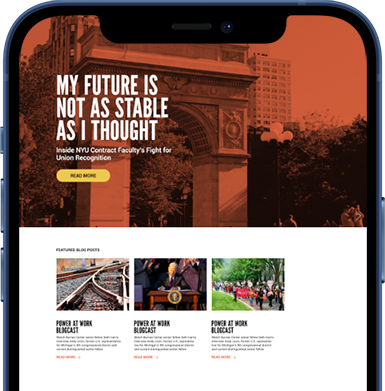Freelance labor journalist Kim Kelly’s debut book, “Fight Like Hell: The Untold History of American Labor,” is not your traditional book detailing labor history. The book’s concentration on marginalized workers and historically exploitative industries is a refreshing change from history books that forget anyone who isn’t a cishet white man.
Kelly introduces us to the history of labor among marginalized communities in America by highlighting those who were so often at the center of the fight but left out of the history — people of color, queer people, and women, for example — and their solidarity with each other that allowed them to achieve such advancements. Their untold stories deserve to be told and listened to.
The book focuses on the rise of labor activism in the late 19th and early 20th centuries. From the young women of Pawtucket, Rhode Island who initiated the country’s first factory strike in 1824 to the underpaid incarcerated people trained to be firefighters in California today, Kelly weaves a compelling narrative of the untold histories of working-class women, people of color, and LGBTQ people. Because it broadens and deepens our understanding of labor history, “Fight Like Hell” is one of the most important books on labor to be published in recent history.
The book is organized by industry with each chapter divided into sections that cover major historical figures or events that changed the state of labor in America. These short, attention-grabbing vignettes offer a look into the world of labor activism, but they’re just that—fleeting glimpses of complex pieces of history. However, its vignette-like structure allows the book to address several different activists and events that aren’t given the attention they deserve in U.S. history textbooks. For example, Kelly profiles figures like Dr. Marie Equi and the Black washerwomen of Mississippi. The book doesn’t try to offer an in-depth analysis of workers’ rights. Instead, it serves as a primer about the country’s history of marginalized workers and their labor activism.
“Fight Like Hell” is an important read, especially considering the surge of union busting, racism, homophobia, transphobia, and classism occurring across the country. Kelly confronts our current struggles by telling the stories of marginalized labor activists, many of whom worked in industries that have long been rife with exploitation, like agriculture and domestic work. She emphasizes the importance of solidarity among marginalized people to overcome these challenges. By putting the spotlight on the critical activism of marginalized workers, Kelly is changing the conversation about labor in America in a critical way. Our written history of the working class must be a true reflection of its composition—not one that only highlights cishet white men. As Kelly often reminds the reader, working class solidarity is necessary for liberation.
Another strength of the book is its readability. Kelly’s writing style is simple. She avoids complex vocabulary that would be inaccessible to most readers. She tells the stories of often eccentric labor activists in a smooth, logical way that keeps the reader engrossed in their stories. Kelly utilizes colloquial language to connect modern audiences to the stories of the past. The accessibility of Kelly’s writing shows the book’s commitment to furthering the cause of worker power through education.
Overall, I would give “Fight Like Hell: The Untold History of American Labor” a four star rating out of five. For the introductory history it is, the book is done exceptionally well. It’s a reminder that while we have far to go in the fight for worker power, there are dozens of activists that fought before us, and their stories offer models we can follow. Anyone looking to begin learning about the history of worker power should pick it up.

